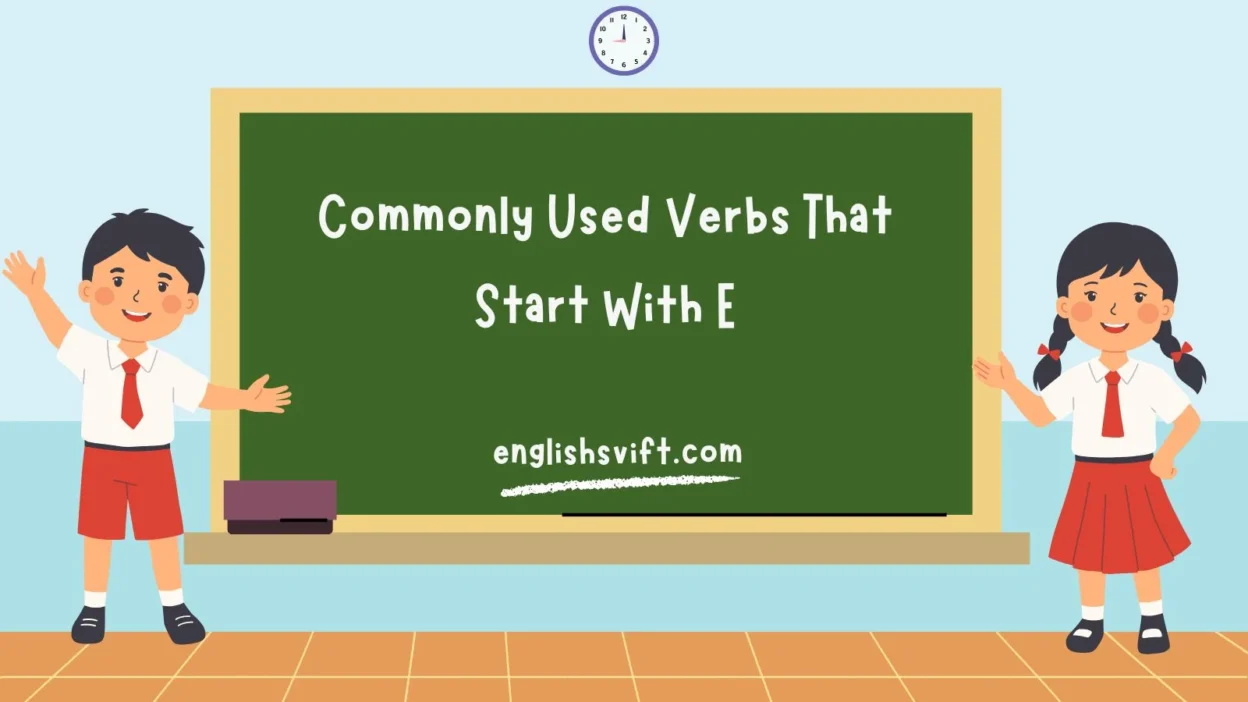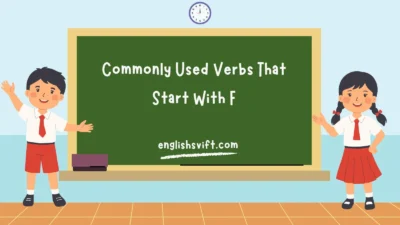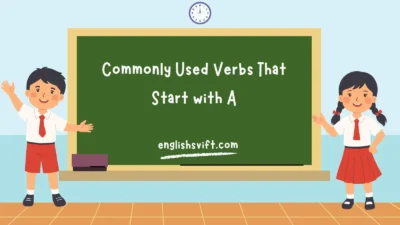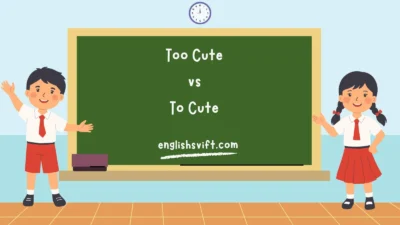Language is powerful, and verbs are its engines. They drive sentences forward, give direction to thoughts, and transform vague ideas into concrete action. Among the alphabet’s offerings, verbs that start with “E” are especially dynamic. They’re versatile, vivid, and useful in everyday speech, business communication, storytelling, and academic writing.
This guide takes you on a journey through commonly used E-verbs—their meanings, contexts, synonyms, idioms, and usage tips—helping you speak and write with more clarity, creativity, and confidence in 2025.
Exploring the Power of Verbs Beginning With “E”
Verbs beginning with “E” can express action, emotion, progress, and transformation. They can describe a leader electing a mayor, a teacher empowering students, or an artist evoking curiosity through storytelling.
| Category | Example Verbs | Typical Usage |
| Action & Movement | Embark, Enter, Expand | “They embark on a new journey.” |
| Communication & Clarity | Explain, Elucidate, Express | “She explained the science experiment.” |
| Emotional & Inspirational | Encourage, Empower, Enthrall | “The speech empowered the troops.” |
| Creative & Cultural | Envision, Enrich, Entertain | “They enriched the cultural coastline.” |
Why focus on E-verbs?
Because they’re rich in variety—suitable for formal documents, creative writing, casual conversation, and persuasive speeches.
Everyday Usage of “Embark” in Modern Communication
To embark means to begin a journey, project, or new phase. Originally linked to boarding ships, it’s now used metaphorically.
Examples
- We’re about to embark on a new marketing campaign.
- They embarked on a month-long road trip along the coastline.
| Synonyms | Antonyms |
| Begin, Start | Finish, End |
Pro Tip: Use “embark” when you want to sound purposeful and forward-looking.
How “Elect” Shapes Decision-Making and Leadership
“Elect” means to choose or vote for someone—often in politics but also in organizations.
Examples
- The city will elect a new mayor in September.
- She was elected as the company’s creative director.
| Synonyms | Contexts |
| Choose, Appoint | Government, School Boards, Clubs |
Real-world connection: Words like “elect” carry a sense of responsibility—perfect for leadership and decision-making contexts.
“Elaborate” vs “Elaboration”: Understanding the Nuance
- Elaborate (verb): To explain something in detail.
- Elaboration (noun): The act of giving detail.
| Verb Example | Noun Example |
| Can you elaborate on that idea? | Her elaboration helped clarify the plan. |
Pro Tip: In academic writing, “elaborate” keeps the tone active, while “elaboration” is better for summarizing past detail.
The Motivating Force Behind “Encourage” and “Encouragement”
Encourage means to give someone support, confidence, or hope.
Examples
- Teachers encourage curiosity in students.
- His encouragement boosted team morale.
| Synonyms | Idioms with Similar Meaning |
| Inspire, Motivate | “Light a spark,” “Boost morale” |
Encouragement is a driver for both personal growth and team success.
Using “Empower” to Inspire Confidence and Action
Empower means to give someone the authority, confidence, or means to do something.
Example
- The workshop empowered women entrepreneurs to start their own businesses.
| Formal Usage | Informal Usage |
| Empower communities | Empower your inner creativity |
Empowerment is closely tied to leadership, education, and equality.
“Edify” and “Enlighten”: Verbs That Build Knowledge
Both words mean to educate or improve someone intellectually or morally.
| Word | Nuance |
| Edify | Often moral or ethical teaching |
| Enlighten | Sharing knowledge or clarity |
Example
- The documentary enlightened viewers about environmental issues.
The Expressive Strength of “Express” and “Expression”
To express is to convey thoughts, feelings, or ideas.
Examples
- She expressed gratitude for the company’s support.
- Art is a form of expression.
| Synonyms | Antonyms |
| Convey, Show | Hide, Conceal |
Captivating Audiences With “Enthrall” and “Engage”
To enthrall is to captivate, while to engage is to involve.
| Word | Usage Example |
| Enthrall | The play enthralled the audience. |
| Engage | Students engaged in lively debate. |
Both verbs are perfect for storytelling and education.
“Evoke” and “Elicit”: Triggering Thoughts, Feelings, and Ideas
- Evoke: Bring a memory or feeling to mind.
- Elicit: Draw out a response or reaction.
| Evoke Example | Elicit Example |
| The painting evoked nostalgia. | The question elicited laughter. |
Enhancing Communication With “Explain” and “Elucidate”
Both mean to make something clear. “Explain” is everyday English, while “elucidate” is more formal.
Example
- The professor elucidated the theory for his students.
Real-Life Examples of “Excel” in Action
Excel means to be exceptionally good at something.
| Field | Example |
| Sports | She excelled in marathon running. |
| Business | He excels at negotiation. |
When to “Expand” vs “Extend” in Conversations
- Expand: Increase in size, scope, or detail.
- Extend: Lengthen in time or space.
| Expand Example | Extend Example |
| Expand your vocabulary. | Extend the deadline by two days. |
The Creative Edge of “Envision” and “Experiment”
- Envision: Imagine something as a future possibility.
- Experiment: Try out new methods or ideas.
Example: The team envisioned a coastline resort and experimented with eco-friendly designs.
“Enjoy,” “Entertain,” and “Engross”: Verbs for Pleasure and Focus
| Verb | Nuance |
| Enjoy | Take pleasure in |
| Entertain | Provide amusement |
| Engross | Fully absorb someone’s attention |
How “Enhance” and “Enrich” Improve Quality and Value
Enhance means to improve or intensify, while enrich means to add value.
| Enhance Example | Enrich Example |
| Enhance image quality. | Travel enriches your worldview. |
“Execute” and “Expedite”: Action-Oriented E-Verbs
- Execute: Carry out a plan.
- Expedite: Make something happen faster.
Example
- We expedited delivery to meet the client’s deadline.
Using “Embrace” to Foster Relationships and Unity
Embrace can mean physically hugging or accepting an idea.
Example
- They embraced new technology in their company.
The Importance of “Endure” and “Ensure” in Resilience
- Endure: Survive hardship.
- Ensure: Guarantee an outcome.
Example: She endured the harsh winter and ensured her family’s safety.
“Empathize,” “Encapsulate,” and Emotional Intelligence
These verbs help in understanding and summarizing feelings or ideas.
Practical Grammar Tips for Using E-Verbs Correctly
- Match tense with context.
- Avoid redundancy—don’t pair “elaborate” with “in detail” unnecessarily.
Synonyms and Antonyms for Common E-Verbs (Table)
| Verb | Synonyms | Antonyms |
| Embark | Start, Begin | End, Finish |
| Empower | Enable, Authorize | Weaken, Restrict |
Fun Idioms and Phrases Using E-Verbs
- Embrace change
- Evoke memories
- Elect to go
Quick Reference Table of E-Verbs for Writers and Speakers
| Verb | Quick Meaning |
| Enhance | Improve |
| Elaborate | Add detail |
| Engage | Involve |
FAQs
Q1: What are the most common E-verbs in 2025?
Embark, Elect, Empower, Enhance, Engage, Explain, Excel.
Q2: Which E-verb is best for persuasive writing?
“Empower” and “Enthrall” are strong persuasive verbs.
Q3: What’s the difference between “Evoke” and “Elicit”?
Evoke brings feelings to mind; elicit draws out responses.
Q4: Can E-verbs be both formal and informal?
Yes—“Explain” is informal, “Elucidate” is formal.
Q5: How do I remember more E-verbs?
Use them in daily writing and speech; create flashcards.
Conclusion
Verbs starting with “E” are more than just words—they’re tools for action, persuasion, and expression. Whether you’re embarking on a project, empowering a team, or evoking emotions through storytelling, these verbs enhance communication and enrich your ideas.
By understanding their nuances, you can excel in writing, speaking, and connecting with people in every context.



